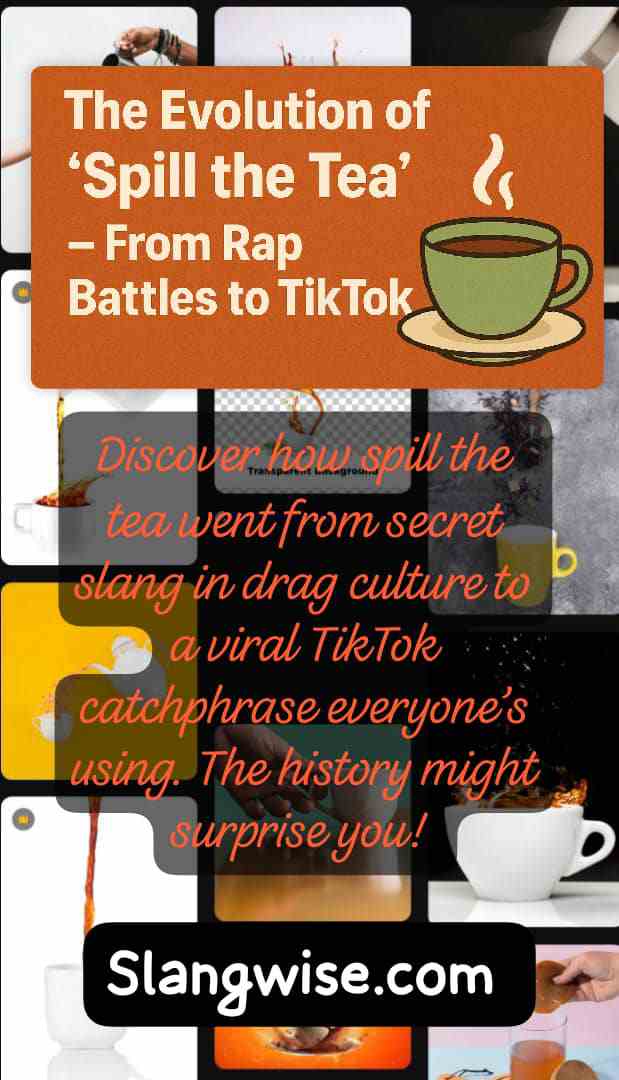I love how language can carry a whole world inside a two-word phrase. Spill the tea isn’t just silly gossip, it’s a tiny cultural freight train that started in Black drag rooms and queer spaces, drifted through rap battles and late-night comedy, then exploded into the TikTok-era way we invite someone to tell the truth.
In this post I’ll trace that journey: where the phrase came from, how it moved between communities, and why its rise matters for the way slang travels, and who gets left out of the story.
Table of Contents
In a Nutshell
- Origins in Hidden Communities: Spill the tea began as AAVE shorthand for “truth,” first used in Black drag culture to signal juicy gossip or real talk.
- Literary & TV Debut: The phrase popped up in John Berendt’s 1994 novel Midnight in the Garden of Good and Evil and later surfaced on shows like RuPaul’s Drag Race and in Larry Wilmore’s comedy bits.
- From Underground to Mainstream: Rap battles and hip-hop circles valued the art of sharing secrets; soon media personalities and reality TV spread the term beyond its roots.
- Digital Explosion on TikTok: Since about 2017, TikTok creators have turned “spill the tea” into viral challenges, storytime skits, and memes, often paired with Kermit sipping tea gifs, to invite everyone to dish the latest drama.
SlangWise Thought: “Remember, tea fuels conversation, but respect who’s behind the kettle.”
From street-level gossip to global meme, spill the tea has evolved into one of the most recognizable slang expressions in English. Its journey from niche drag balls to TikTok trends reveals how language shifts and adapts across communities and platforms.
Spill the tea meaning: A Truth About Tea
The term “tea” originally stood for “truth” in Black drag circles. When someone had the real story or scandal, they offered “the tea.” To spill the tea meant to hand over those secrets, nothing to do with pouring a beverage, but everything to do with revealing information.
This usage was first documented in 1994, when Lady Chablis in Midnight in the Garden of Good and Evil referred to her “T”, her personal business, and paved the way for a broader audience to pick up the phrase .
Broadening the Audience
By the early 2000s, comedy shows and reality TV brought “tea” into living rooms. Larry Wilmore’s “weak tea” jabs on Comedy Central and catchphrases on RuPaul’s Drag Race introduced non-LGBTQ viewers to the slang. ~Spill the tea – grammarhow.com~
As hip-hop culture thrived on lyrical combat and rap battles, where artists “spill” bars about rivals, the metaphor of sharing hot gossip resonated outside drag halls and studios alike .
Social Media’s Boiling Point
The true tipping point arrived with social platforms. Around 2017, Twitter users and Instagram commentators adopted spill the tea to request celebrity scoop; soon after, TikTok creators launched spill the tea challenges, using the phrase to kick off storytime videos about personal drama, viral news, or life hacks.
The Kermit sipping-tea GIF became shorthand for passive commentary, “That’s none of my business”, while still inviting viewers to lean in .
Loved learning the story behind spill the tea? 🍵 Don’t stop there! Check out my post on 250 Most Popular Internet Slang Terms of 2025 and test your slang IQ with the Ultimate Slang Quiz: find out how fluent you really are in online talk! 💬🔥
Significance
Today, spill the tea underscores two key trends: a thirst for authenticity and the power of shared experiences. In an era of curated social feeds, unfiltered gossip offers a sense of realness. At the same time, the phrase exemplifies how marginalized communities enrich mainstream vocabulary.
From AAVE origins to global acceptance, the journey of “tea” highlights language’s ability to unite people through shared stories, whether they’re celebrity scandals or everyday office gossip .
Spill the Tea: How to Use It Wisely
While spill the tea is fun and playful, respect matters. Casual chats with friends are the perfect setting, but avoid forcing someone to share private matters. And remember the phrase’s roots: acknowledging its origin in Black drag culture honors the communities that brewed it.
Concluding Thought
By tracing its path, from secret conversations in rap battles and drag balls to viral trends on TikTok, spill the tea stands as a testament to the fluid, community-driven evolution of slang.
Whether you’re asking for the latest scoop or setting the stage to reveal news, tea remains a flavorful way to connect.

